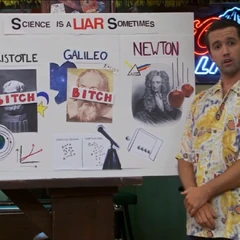As was already mentioned in the thread, if you think THAT'S wild, look up Jack Parsons, one of the earliest figures in the history of the US's Jet Propulsion Laboratory. Directly mentored by Aleister Crowley, had L. Ron Hubbard as his lab assistant, LOST HIS FIRST WIFE TO L. RON HUBBARD, and then got blown up by fulminate of mercury like in breaking bad. He made L. Ron watch him as he nutted all over some stone tablets, though, so I guess he got one on him.
I mean, not only that, but like... you ever looked into Hegel's, erm, "interests?" If you connect Hegel's thought to his ACTUAL intellectual antecedents, it becomes no great stretch of the imagination to say that Hegel's successors are just as much inheritors of the Western Mystery Tradition as anything else. My NUCLEAR TAKE is that Marxism, Dialectical Materialism especially, is effectively a materialist Hermeticism without a law of correspondences. A lot more of the world we live in today comes from these weird mystical traditions than you might expect.
It's not even a "past" thing, really. I'm aware of at least a few dudes with PHDs in stuff like neuropsychology who take this occultism stuff seriously. And at least one PhD in history who's recognized for his work in charting the migratory path of ceremonial magic in the West who got that PhD because he was a ceremonial magician.
I hard agree on this. I'm of the opinion that these people probably COULDN'T do the accomplishments that they did if they didn't believe what they did. Look at Srinivasa Ramanujan and how his religious experiences connected intimately with his mathematical proofs. Or look at John Dee's understanding of mathematics, which is pretty much what ended up leading him to where he ended up. Or, again, Jack Parsons. A lot of the time we see people connecting these powerful, internal, and numinous experiences and then bringing something immensely practical into our shared world.





